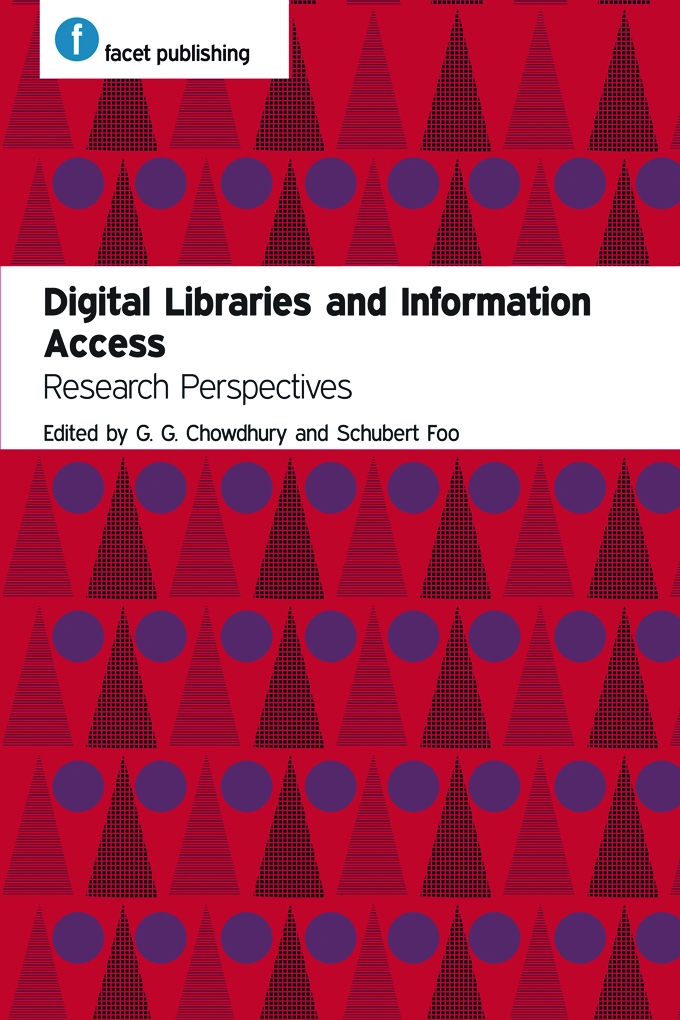Book contents
- Frontmatter
- Contents
- Foreword
- Editors and contributors
- 1 Digital libraries and information access: introduction
- 2 The design and architecture of digital libraries
- 3 Metadata and crowdsourced data for access and interaction in digital library user interfaces
- 4 Information access
- 5 Collaborative search and retrieval in digital libraries
- 6 The social element of digital libraries
- 7 Towards socially inclusive digital libraries
- 8 Users’ interactions with digital libraries
- 9 Digital libraries and scholarly information: technology, market, users and usage
- 10 Digital libraries and open access
- 11 iSTEM: integrating subject categories from multiple repositories
- 12 The usability of digital libraries
- 13 Intellectual property and digital libraries
- 14 Digital preservation: interoperability ad modum
- 15 Digital libraries and information access: research trends
- Index
- Miscellaneous Endmatter
10 - Digital libraries and open access
Published online by Cambridge University Press: 08 June 2018
- Frontmatter
- Contents
- Foreword
- Editors and contributors
- 1 Digital libraries and information access: introduction
- 2 The design and architecture of digital libraries
- 3 Metadata and crowdsourced data for access and interaction in digital library user interfaces
- 4 Information access
- 5 Collaborative search and retrieval in digital libraries
- 6 The social element of digital libraries
- 7 Towards socially inclusive digital libraries
- 8 Users’ interactions with digital libraries
- 9 Digital libraries and scholarly information: technology, market, users and usage
- 10 Digital libraries and open access
- 11 iSTEM: integrating subject categories from multiple repositories
- 12 The usability of digital libraries
- 13 Intellectual property and digital libraries
- 14 Digital preservation: interoperability ad modum
- 15 Digital libraries and information access: research trends
- Index
- Miscellaneous Endmatter
Summary
Introduction
Open access, defined simply as access to digital content free at the point of use, is a movement that began nearly two decades ago. It had its origins on the one hand in the exponential rise in the costs of scholarly information sources, especially journals, and on the other hand in the ease of publication and communication facilities that became available with the advent and proliferation of the internet and various new e-publishing models and standards. However, there is a bigger and altruistic reason behind the open access initiative. It has been driven by the need to provide better access to and sharing of information for research and scholarly activities. Open access facilitates research and scholarly activities in a number of ways, for example, by opening research and scholarly knowledge to all so that more researchers can access that knowledge build on it, thereby meeting another goal of less duplication of research efforts (JISC, 2011a). Open access benefits different stakeholders. Through open access:
• researchers can reach a greater audience and thus their research can be more widely read and cited
• institutions gain an enhanced reputation, and thus a better competitive edge, as their research becomes more visible
• funding agencies see a greater return on their investment because the research funded by them can reach more people
• publishers find that the impact of their journals increases as a result of greater access.
Thus, although the open access movement was initiated to find an alternative to the problems facing academic and scholarly communities due to the soaring price of journals, it does more social good by promoting better and easier access to knowledge for everyone, not necessarily the small group of people who are associated with relatively rich institutions. However,
it a kind of second-class, cut-price publishing route. It is simply a means to make research results freely available online to the whole research community.
(JISC, 2011b)This chapter discusses the issues of open access and institutional repositories in the context of open access digital libraries. It briefly introduces the concept of Open Archives Initiative (OAI) and institutional repositories.
- Type
- Chapter
- Information
- Digital Libraries and Information AccessResearch perspectives, pp. 143 - 154Publisher: FacetPrint publication year: 2012



